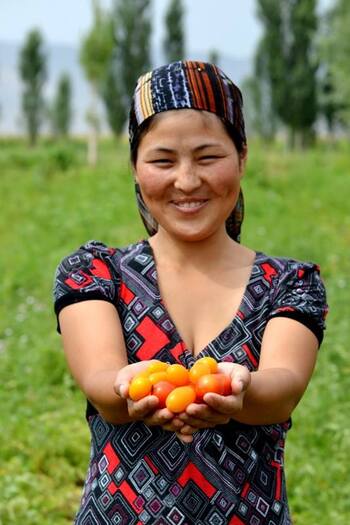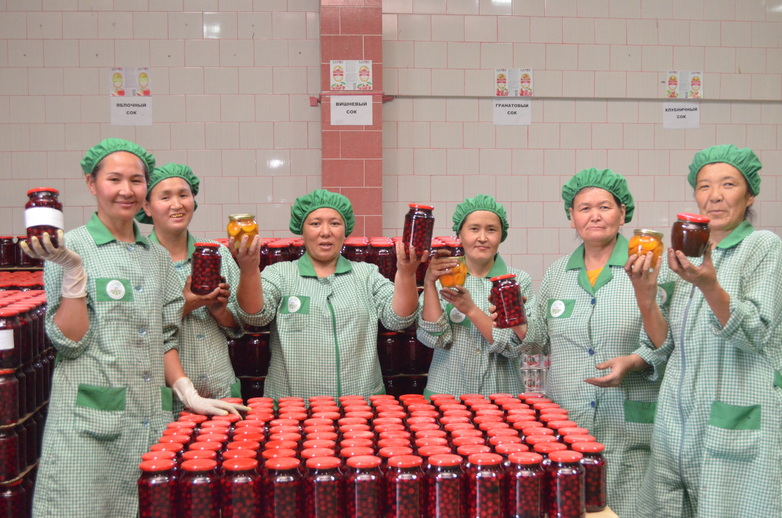Promoting Sustainable Economic Development
Project description
Title: Promoting Sustainable economic development
Commissioned by: German Federal Ministry for Economic Cooperation and Development (BMZ)
Country: Kyrgyzstan
Lead executing agency: Ministry of Economy of the Kyrgyz Republic
Overall term: 2014 to 2019

Context
Kyrgyzstan’s business landscape is dominated by micro and small enterprises. Agriculture accounted for 18 per cent of the country’s gross domestic product of USD 6.5 billion in 2015. About 30 per cent of the population works in the agriculture sector. The low productivity of farmers and processing companies means they are struggling to compete at the international level, can only achieve low incomes and are over-exploiting natural resources. Integration into regional and global value chains can only be achieved with high-quality products. Membership of the Eurasian Economic Union (EAEU) and inclusion in the EU’s Generalised System of Preference Scheme, GSP+, provide new opportunities for promoting exports. To take advantage of these opportunities, Kyrgyzstan needs to adapt its legal frameworks and reduce environmental risks. Staff in institutions, authorities and companies also need the necessary knowledge, structures and processes to implement the required changes in practice. In the food processing industry, for example, EAEU legislation calls for the introduction of quality management systems (QMS) of a standard equivalent to the EU’s legal standards for food safety.
Policies and strategies for implementing reform projects that aim to promote social and ecological sustainability have, for the most part, been fragmented and inconsistent to date. They have also not been adhered to properly, and are often not geared to the needs and opportunities of the private sector. The private sector is therefore struggling to adapt to the new requirements. Although there is the potential to create more jobs and higher incomes for staff by adopting elements of the green economy and through cleaner production, companies are unable to realise this.
Objective
Incomes and employment in Kyrgyzstan have risen due to the promotion of sustainable economical development that takes into account elements of the green economy.

Approach
The project team promotes value chains within various sectors, thus increasing their competitiveness. In the areas of agro-eco tourism, livestock farming, fruit and berries, walnuts and sugar beet, it provides know-how through training. The technical and commercial training provided for staff at the chambers of commerce and professional associations, as well as for stakeholders involved in production, logistics and trade improves their capacities in the areas of resource efficiency and organic quality. The Import Promotion Desk platform supports trade fair appearances of selected companies at events such as BIOFACH in Nuremberg, and the AFC Consulting Group supports value chain promotion and food safety.
The Swiss Agency for Development and Cooperation provides financial support for project activities in the province of Jalal-Abad. This facilitates the promotion of economic development in the province. Training for government, civil society and private sector stakeholders improves their institutional and individual capacities. The project team organises various dialogue formats between these stakeholders down to the community level, addressing issues such as environmental sustainability and resource efficiency. The team also promotes business services and ‘green’ start-up initiatives. The GFA Consulting Group supports these activities in Jalal-Abad.
The project team advises banks on the development of financial services tailored to the needs of micro and small enterprises and agricultural producers. This enables them to take out small loans that can be used to expand their businesses or to buy agricultural equipment to increase yields. The project also supports implementation of the national strategy to foster financial literacy by offering farmers and women in rural areas the opportunity to acquire basic knowledge in the fields of business and budgeting.
The project works with the Ministry of Economy to develop reforms that promote economically, environmentally and socially sustainable growth. The aim is to support the transition from a conventional economy to a green economy. For this work, the project team advises the State Agency for Investment and Export Promotion, and supports the implementation of the national export strategy and the OECD competition recommendations.
Results
The socially and environmentally sustainable results achieved by the project facilitate the transition to a green economy. In the field of agrotourism, for example, 60 farming households have received training on how to welcome international guests and offer resource-efficient services. The concept was presented in collaboration with a Kyrgyz provider at the travel trade show ITB Berlin, and a website on agrotourism in Kyrgyzstan has been set up. With support from the project, a Kyrgyz walnut supplier has been awarded Fairtrade certification, and now supplies a buyer in the Netherlands with 20-30 tonnes of dried walnuts per year. Using modern production methods and better seeds supplied by German company KWS Saat AG, sugar beet growers have increased their average yields from 32 to 58 tonnes per hectare. Through contract farming with a sugar factory, sugar beet cultivation now provides a secure income. The contracts serve as a guarantee for farmers taking out ‘sweet loans’, which were developed in conjunction with KfW Development Bank.

The project has also trained 400 farmers in the fields of animal health and hygiene standards to ensure that the high-pasture beef, which is highly popular in the region, is fit for export. Internationally recognised standards are also being introduced in 30 farms. A halal slaughterhouse equipped to international standards has already been opened, and two more are planned. This will enable the meat to be sold in Muslim countries in the region.